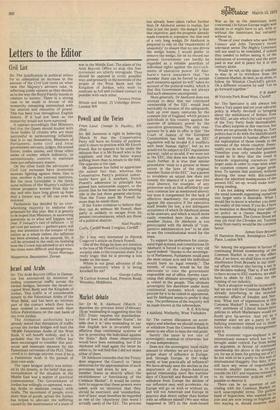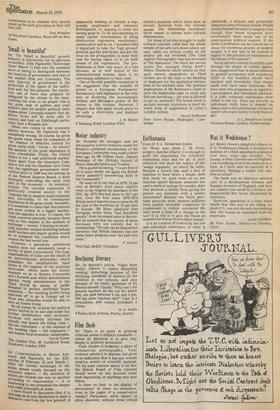Market debate
Sir: Dr M. B. Akehurst (March 1) describes my previous letter (February 15) as "misleading in suggesting that the EEC Treaty requires the standardisation of laws in all member States"; he adds that it is "also misleading to say that English law is invariably more effective than continental systems of law in protecting the individual against the State." Both these observations would have been misleading, but if Dr Akehurst will read again the letter he refers to, he will find that I did not make either of them.
Dr Akehurst concedes that the Treaty does empower the Council to "issue directives for the approximation of such provisions laid down by law . . in member States as directly affect the establishment or functioning of the Common Market". It would be unrealistic to suppose that these powers were taken with no intention that they should be exercised, and 'standardisation of laws' must therefore be regarded as one of the 'objectives' (the word actually used) of the EEC. The process has already been taken rather further than Dr Akehurst seems to realise, but that is not the point: the danger is that this objective, and the progress already made towards it, represent the thin end of a very long wedge. Dr Akehurst is prepared to rely on the 'requirement of unanimity' to ensure that no one drives the wedge home; 1 would prefer to remove the wedge, for on its record our present Government can hardly be regarded as a reliable guardian of individual rights against the encroachments of executive power. Dr Akehurst's naive assurance that "no member State can be forced to accept such measures against its will" takes no account of the political reality, which is that this Government may not always find such measures uncongenial.
More generally, Dr Akehurst does not attempt to deny that our continued membership of the EEC would lead inevitably to erosion of the safeguards, built up over many centuries by the common law of England, which protect individuals in this country against the exercise of arbitrary power by the executive government. The only reassurance he is able to offer is that "the Court of Justice of the European Communities has held that an EEC regulation will be invalid if, it conflicts with basic human rights"; but as we would not be subject to EEC regulations anyway, valid or invalid, if we were not in the EEC, this does not take matters much further. It is true that similar procedures "exist to a greater or lesser extent in the laws of the original member States of the EEC", but a power to invalidate an unjust law does not remedy the absence of a just one (the total absence, for example, of any protection such as that afforded by our own common law as mentioned above); nor does it compensate for the lack of effective machinery for proceeding against the executive if the executive itself breaks the law, a not infrequent occurrence of which Dr Akehurst seems to be unaware, and which is much more easily remedied here than in other member States. Dr Akehurst is too preoccupied with the details of "comparative administrative law" to be able to see the constitutional wood for the trees.
To support his preference for continental legal systems and constitutions Dr Akehurst is forced to scrape a very old barrel indeed: "thanks to the sovereignty of Parliament, Parliament could pass the most unjust acts and the individual would have no legal remedy." The remedy, of course, would be for the electorate to vote the government responsible out of office, thereby exercising that ultimate sovereignty which is vested in the people. This ultimate sovereignty lies elsewhere under most continental systems, which usually provide for it to be vested in appointees, and Dr Akehurst seems to prefer it that way. The preference of the majority will be made known at the referendum.
R. E. Kitching 4 Ashfield, Wetherby, West Yorkshire Sir: The current discussion on sovereignty and whether we should remain in or withdraw from the Common Market seems to me often to miss the real point.
Surely the issue is not one of sovereignty, nominal or otherwise, but of real independence.
Does not the sovereignty issue really amount to whether we are to have our proper share of influence in \Eur pe, and, through Europe, in the \ wi er world, or lose practically all influence? We have already seen the decline in the lt
importance of the Ang o-American
special relationship since e\ wartime days of Churchill and Roo ' velt. If we withdraw from Europe the decline of our influence may well accelerate, for Europe will go on with or without us, and will not American and Europe in' practice deal direct rather than bother with an offshore island? (We saw what happened in 1973 in the Arab-Israeli
War so far as the Americans were concerned.) In future Europe might well decide to or might have to act, with or without the Americans, but certainly without us.
Those of your readers who saw Peter Ustinov and John Terraine's recent television series The Mighty Continent will not need to be reminded, if indeed they needed to before seeing it, of the limitations of sovereignty and the price paid in war and in peace for it in this century alone.
Would we not, on this issue of whether to stay in or to withdraw from the Common Market, do best,'as so often, to follow Sir Winston Chuijchill's advice. On a different occasion he said "Let us go forward together."
P. B. Baker 40 Victoria Park Road West, Cardiff
Sir: The Spectator is and always has been a Tory paper and yet your editorial policy is wholly devoted to bringing about the withdrawal of Britain from the EEC, an aim which thevast majority of the Tory Party finds discreditable. You affect surprise at this reaction, but there are no grounds for doing so. TorY politics has to do with the identification of genuine trends in human affairs and the exploitation of those trends in the interests of the whole country. Presumably you do not dispute that premise. ThereforeYour only tenable position would be to deny that the trend is towards organising ourselves into larger units in order to cope with what by common consent are larger problems. To sustain that position, without blurring the issue with discussions about the admitted inadequacies of the present EEC set-up, would make interesting reading. I am not asking whether you think the trend towards organising ourselves into larger units is desirable. What I would like to know is whether you denY the reality of this trend. If you do, I have no hesitation in describing your editorial policy as a classic example of neo-appeasement. The Gower Street set may yet rival the Cliveden set. Turning away from reality would be the common factor.
James Gore Browne 10 Hamston House, Kensington Court Place, London W8
Sir: Among the arguments in favour of continuing British membership of the Common Market is one to the effect that, if we leave, we shall have to accept interference from Brussels in our internal affairs without also having a say in the decision-making. That is, if we wish to have access to EEC markets, we shall have to abide by EEC rules for the running of our industry. Such a situation would be intolerable. , but we are told the Common Market is already interfering in the internal economic affairs of Sweden and Norway. What sort of organisation is this Common Market? It seems to be the very antithesis of Liberal laissez-faire policies to which Marketeers would no doubt give lip-service. And yet as a member state we are a party to the bullying treatment meted out to those states who make trading arrangements with it.
This economic rogue-elephant is an international menace which has to pe brought under control. Far from being an argument in favour of continued membership the above is the strongest yet, for me at least, for getting out of It! I do not wish to be a party to this sort of international thuggery. Our duty, if, W. e still have any sense of responsibility towards smaller nations, is to get outside the EEC and organise resistance to its interventionist policies and It
possible to destroy it.
our
There can be no question of
trading with the Common Market on such unacceptable terms. The gutless band of hypocrites, who wanted us to join and are now trying to frighten ns into staying in, should examine their
consciences as to whether they should stand up for such principles as they still have left.
Don Weedon
16 Winsford Gardens, Westcliff-on-Sea, Essex.



































 Previous page
Previous page